“He would preach, ‘Try having a colonoscopy or dialysis without soft plastic tubing; or would you like a sigmoidoscopy with a steel tube?'” [ACSH]
Posts Tagged ‘CPSIA and phthalates’
“Birth Defect Study Casts Doubt on Phthalate Fears”
What, you mean the phthalate provisions in CPSIA might have been an overreaction? [Scientific American, July]
More: “Why It’s Impacting Textile Screen Printing” [Ed Branigan, International Coatings Blog]
CPSIA chronicles, September 12
- On Thursday Henry Waxman’s House Commerce Committee finally held its long-promised hearing on the Consumer Product Safety Improvement Act, the first such hearing by a committee with legislative jurisdiction since the calamitous law went into effect in February.
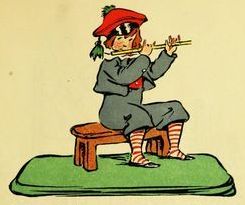 (The Small Business Committee, a panel with no legislative authority over the law, had gone first.) As noted last week, Thursday’s virtually dissent-free event hardly counted as much of a hearing, since Waxman turned down all pleas to allow testimony from actual affected businesses or other critics or victims of the law. Instead he called as his single witness recently appointed CPSC chair Inez Tenenbaum, who hewed closely to the line he (Waxman) wished to hear. A Washington Times editorial is appropriately scathing, and Rick Woldenberg has much more about the committee majority’s finger-in-ears response to the broad outcry over the law. Ranking Republican Joe Barton (R-Texas), who supported the law’s passage, did say that “we have all been inundated” with constituent messages about its ill consequences. The Handmade Toy Alliance has published the statement that Jill Chuckas of Crafty Baby would have made if invited to testify (more).
(The Small Business Committee, a panel with no legislative authority over the law, had gone first.) As noted last week, Thursday’s virtually dissent-free event hardly counted as much of a hearing, since Waxman turned down all pleas to allow testimony from actual affected businesses or other critics or victims of the law. Instead he called as his single witness recently appointed CPSC chair Inez Tenenbaum, who hewed closely to the line he (Waxman) wished to hear. A Washington Times editorial is appropriately scathing, and Rick Woldenberg has much more about the committee majority’s finger-in-ears response to the broad outcry over the law. Ranking Republican Joe Barton (R-Texas), who supported the law’s passage, did say that “we have all been inundated” with constituent messages about its ill consequences. The Handmade Toy Alliance has published the statement that Jill Chuckas of Crafty Baby would have made if invited to testify (more). - In an August 26 WSJ letter to the editor, Eric Havill of Branchport, N.Y. observes that Congress’s refusal to fix the law “is, if possible, even more irresponsible than the original legislation.”
- By a unanimous vote, the CPSC recently confirmed that Mattel, the giant toymaker whose many recalls helped touch off the lead-in-toys panic in the first place, has qualified for an exemption from third-party (outside lab) testing of its products under CPSIA, and can instead test in its own in-house labs. Of course, most of Mattel’s competitors are less fortunate and do not operate on a scale that will make such an exemption feasible. The exemption for “firewalled” in-house labs, deemed by one critic a “hall pass,” was something Mattel obtained through intense lobbying back when the law was under consideration. Like the other giant in the business, Hasbro, Mattel actively lobbied for CPSIA’s passage, and even as the law has brought undreamt-of woe to thousands of smaller producers of kids’ products, the two big companies seem to be doing rather well under it. More: Timothy Carney, Washington Examiner; Brad Warbiany, Liberty Papers; Christopher Taylor, Word Around the Net. Other reactions to the exemption: Holly Jahangiri, Rick Woldenberg, Ed Morrissey/Hot Air (“one of the companies that created the problem in the first place has gotten a waiver”), Katherine Mangu-Ward/Reason (“Mattel now has a cost advantage on mandatory testing, and a handy new government-sponsored barrier to entry for its competitors”), Handmade Toy Alliance.
- What’s going to replace forbidden phthalates in kids’ products now that CPSIA has banned them? Probably alternative plasticizing chemicals about which we know less, notes Andrew Langer in Roll Call.
- It’s old news, of course, that the CPSC asserts the power to go after eBay and Craigslist sellers, church bazaars, homeowners who hold yard sales and other sellers of used items that do not comply with CPSIA and other safety standards (although evidence is very sparse that most members of Congress actually realized the law would reach sales of those kinds.) Last month the CPSC saw fit to announce “Resale Roundup”, a new crackdown on secondhand sales. It also revised its book of guidance for resellers, in ways Rick Woldenberg finds less than enlightening. Discussion: Adler/Volokh, Ed Morrissey/Hot Air (“What did we ever do before the CPSIA protected the US through its throngs of federal nannies? How did we ever survive garage sales in the past 233 years?”), Washington Times (“from yard sales to jail cells”), Katherine Mangu-Ward/Reason, John Stossel, Deputy Headmistress/Common Room (“Remember when Congress assured us that the little guys had NOTHING to worry about with the CPSIA because they weren’t going to come after us? They. Lied.”) On the brighter side, McClatchy’s James Rosen quotes spokesperson Scott Wolfson as saying the commission isn’t planning to seek admittance to inspect private homes and garages to enforce the law. So be thankful for small favors.
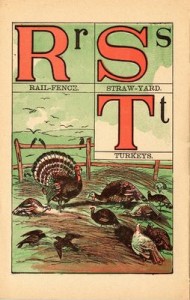
PUBLIC DOMAIN IMAGES from Ethel Everett, illustrator, Nursery Rhymes (1900), and (illustrator not known) Farm Yard ABC (c. 1880), both courtesy ChildrensLibrary.org.
CPSIA chronicles, June 18
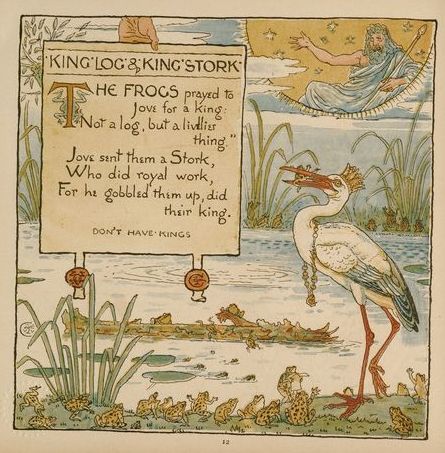
- As noted earlier, the next all-out debacle on the CPSIA front is expected to result from the law’s tracking and labeling regulations, due to take effect August 14, and for which the CPSC has not yet issued guidance, although product makers ordinarily need to resolve crucial issues of manufacturing (as with etching of lot numbers) and packaging at least many months if not longer in advance of sale. Sharon McLoone at CNNMoney had quite a good report a week ago on this latest crisis, which as of this writing has not been followed up much of anywhere else in the press. This continues the pattern in which 1) most key elements of the ongoing CPSIA disaster get good coverage in at least one (sometimes more) major media outlets; 2) the bigger-picture disaster of the law never quite succeeds in breaking out into general coverage as a national story, in large part because 3) the agenda-setting New York Times never consents (even six months into the story!) to give the matter any coverage at all. For more hints on the approaching tracking-label train wreck, see this op-ed by a South Carolina maker of school supplies (“Companies such as ours are now forced to guess about their new legal requirements. … My company may have to change labels hundreds of times a week in our two factories. The investment necessary to handle this new rule alone is crippling.”), or the comments of appliquéd bib maker Laurel Schreiber of Lucy’s Pocket (if the testing doesn’t get her, the tracking labels will), or of New Jersey wooden toy maker John Greco (advised that tracking info would add $3.50 to $5.00 to cost of making $10 handmade toy). And here’s a view from the home furnishings business.
- No, the menace to pre-1985 children’s books has not gone away, not in the least. Librarians and publishers remain on the edge of their seats awaiting exemptions, clarifications or both. There was some good coverage last month in the Sioux Falls Business Journal (store owner Jenny Cook “had to throw out only 30 books at her store to comply” because most were newer; “Siouxland Libraries has pulled a list of books that were published before 1985”) and at Syracuse.com (“When you think through the implications, it means closing our libraries to children”). And in a sign of possible things to come, ABC-affiliated stations in Seattle and Washington, D.C. have now run sensationalist “toxic books!” attacks on local libraries [Common Room, ShopFloor] More: Winifred Maker, Anderson Valley Post (April).
- The CPSC’s stay of enforcement didn’t really solve the problem of the ban on dirtbikes and mini-ATVs, and responsible users and dealers end up getting the short end of the stick [Jason Giacchino/ATVSource, Vince Castellanos/ESPN FMX, Motorcycle Industry Council, Charleston (S.C.) Post and Courier]
- Downtown Los Angeles is home to an estimated 500 toy companies — most of them far smaller than crosstown giant Mattel — and they’re in much distress from the law. [Alexa Hyland, L.A. Business Journal] The L.A. Times, which once gave serious scrutiny to the law’s effects on the apparel and resale sectors, seems (scroll) to be dropping the ball.
- Those who remain in the kids’-product business after coping with all the other parts of the law will also want to educate themselves about “recall escrows” [Rick Woldenberg]
- Inez Tenenbaum, named by Obama as new CPSC chair, had her confirmation hearing on Tuesday [ShopFloor and more, Rick Woldenberg]. Nancy Nord earlier stepped down from her role as acting chair.
- What, what, what could they have been thinking? The American Library Association has actually given its 2009 Public Service Award to California Senator Barbara Boxer, a key architect of some of CPSIA’s provisions; the retroactive phthalates ban she championed has been especially effective in forcing “books-plus” off library shelves, and she has turned a coldly unsympathetic ear to cries of distress over the law (via @melanes). To repeat: what could the ALA have been thinking?
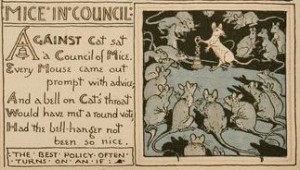
Public domain images courtesy ChildrensLibrary.org: Walter Crane, illustrator, The Baby’s Aesop (1887).
CPSIA chronicles, May 11
- At long last a House committee — the one on Small Business — has announced a hearing on CPSIA’s impact on small business, to take place Thursday. (I’m almost hesitant to report this as good news since the last time I did so it took only hours for the event to be called off). The Small Business panel does not have primary legislative authority in the area; that is vested in Rep. Henry Waxman’s Energy and Commerce Committee, whose CPSIA-overseeing subcommittee has chosen instead to hold hearings on that very urgent subject of public concern, college bowl championships. Rick Woldenberg recalls the fingers-in-ears techniques the House has used to shut out unwanted information up to now: first Waxman/Rush staffers prearranged “hearings” that heard nothing, after which they (successfully up to now) maneuvered to make sure critics of the law would not obtain any official Hill forum at which to air their grievances as public outrage built.
- The Consumer Product Safety Commission has released new guidance (PDF) for thrift shops and other product resellers on compliance with CPSIA and other laws overseen by the agency. According to Ian at Musings at a Catholic Bookstore , the manual lays out policies that differ only slightly from what was known before, often by spelling out what will be made an enforcement priority, since the commission has no power to alter the law’s actual requirements. Thus it seems phthalates in older kids’ playthings, the kind unlikely to be placed in the mouth, are not going to be a high priority in reseller enforcement — which still doesn’t make it legal to resell those items. For many outside readers the biggest surprise seems to have been that the agency views its authority as extending to yard sales. As Ian notes, this isn’t actually news; it’s just that the new manual is spelling it out in a more visible way than it did at some earlier times.
- “Toy Story 3: Emperor Uncle Sam Puts You Out of Business” [Rep. Joe Barton (R-Tex.), The Hill]
- In the ongoing series of crises that is CPSIA, the next major crisis is due on or around August 14, as of which date newly made children’s goods must comply with new tracking and labeling requirements (touched on briefly in this space last month). The intent is to make it easier to trace and contain safety problems, enable recalls and so forth. For makers of children’s apparel, Kathleen Fasanella explains the complicated and sometimes expensive implications in posts here, here, and here. And apparel makers have it relatively easy, in part because they are already used to affixing permanent labels to most products, unlike many makers of items such as wooden toys and pencils, straw dolls, ceramic wall plaques, rubber spiders or bouncy balls, glass bead craft items, and so forth. Toy importer Rob Wilson writes, “this one clause will be enough to finish off a good majority of the companies that the other provisions of the law do not kill first. I personally know of many companies that are planning to close by August 15th if this provision is not amended.” The National Association of Manufacturers has requested (PDF) an emergency stay on the tracking and labeling rules; the CPSC has put off consideration of the request. Rick Woldenberg comments here and here. And tomorrow (Tues., May 12) at 1 p.m., the CPSC is holding a meeting, to which any interested member of the public is invited, to discuss the tracking and labeling rules. (Update: CPSC hearing is online as a webcast (h/t Woldenberg). Kathleen Fasanella has more, including links to more than 500 pages of protest letters, PDF, received by the CPSC on the issue).
- Cutting across multiple lines: per the Bulletin in Bend, Oregon, a local resident whose son got sick from salmonella (and recovered) appeared with Rep. Henry Waxman at a press conference to promote more effective federal food safety regulations; at the same time, though, “Christoferson said she can sympathize with the harm that poorly written rules can do to businesses” because her own resale store in the city of Bend, Stone Soup, has been harmed by CPSIA.
- Whimsical Walney, who has written with passion about the CPSIA fight, has announced that she is closing the doors of her children’s business.
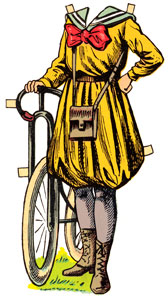
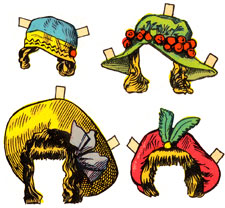
Public domain paper doll images courtesy Karen’s Whimsy.
NPR on CPSIA: “Public Concern, Not Science, Prompts Plastics Ban”
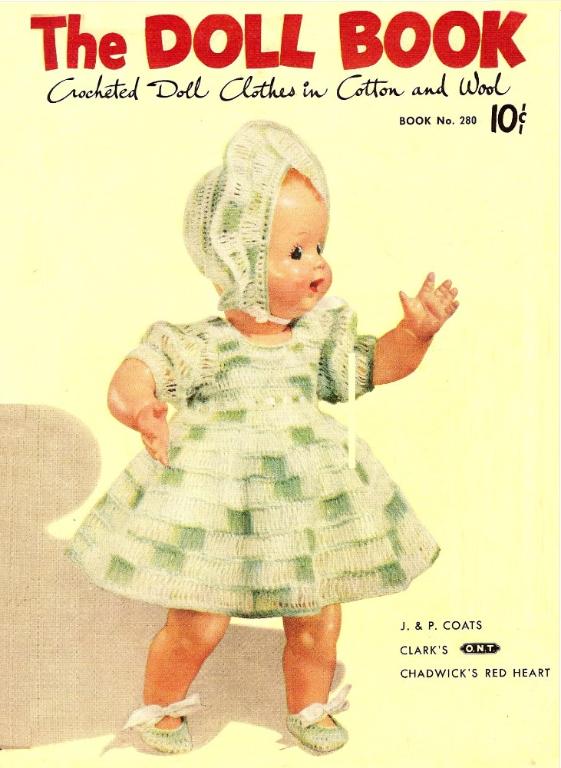
Major story by Jon Hamilton on yesterday’s NPR “Morning Edition”: “A new federal ban on chemical compounds used in rubber duckies and other toys isn’t necessary, say the government scientists who studied the problem.” “Now they tell us,” writes Carter Wood. More from Jonathan Adler @ Volokh and commenters.
Although most coverage of the CPSIA debacle (this site’s included) has focused on the lead rules, the phthalates ban (phthalates are an ingredient often used to make plastic soft and bendable) is also extraordinarily burdensome, for a number of reasons: 1) as readers may recall, a successful lawsuit by the Natural Resources Defense Council and others forced the last-minute retroactive banning of already-existing playthings and child care items, costing business billions in inventory and other losses; 2) vast numbers of vintage dolls, board games and other existing playthings are noncompliant, which means they cannot legally be resold even at garage sales, let alone thrift or consignment shops, and are marked for landfills instead; 3) obligatory lab testing to prove the non-presence of phthalates in newly made items is even more expensive than testing to prove the non-presence of lead. The phthalate ban is also an important contributor to the burden of the law on the apparel industry (the ingredient has often been used in screen printing on t-shirts and similar items) and books (“book-plus” items with play value often have plastic components). AmendTheCPSIA.com has reprinted a letter from Robert Dawson of Good Times Inc., an amusement maker.
Earlier coverage: Feb. 6 (NRDC and allies win court case on retroactivity); Feb. 7 (various points, including Connecticut Attorney General Richard Blumenthal’s vow that his office will “take whatever steps are necessary [emphasis added] to ensure this phthalate ban is enforced”); Feb. 12 (what ingredients in playthings are going to replace phthalates, and are those ingredients going to be more safe or less?); Mar. 4 (vintage dolls); Mar. 11 (California Senators Barbara Boxer and Dianne Feinstein were particularly identified with pushing the phthalates ban to enactment).
P.S. Environmentalists disputing the NPR coverage: Jennifer & Jeremiah @ ZRecommends, Jennifer Taggart (The Smart Mama) in NPR comments. And Sacramento attorney Anthony Caso has a backgrounder for the Washington Legal Foundation (PDF) with more about the CPSC, the NRDC, and maneuvering on phthalates.
